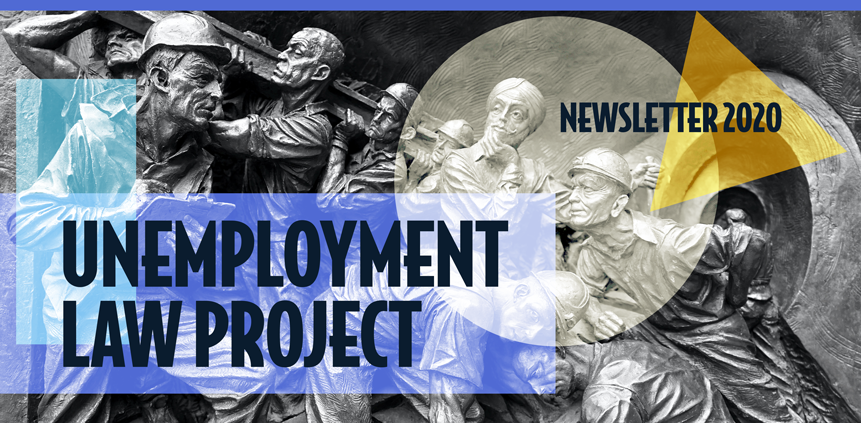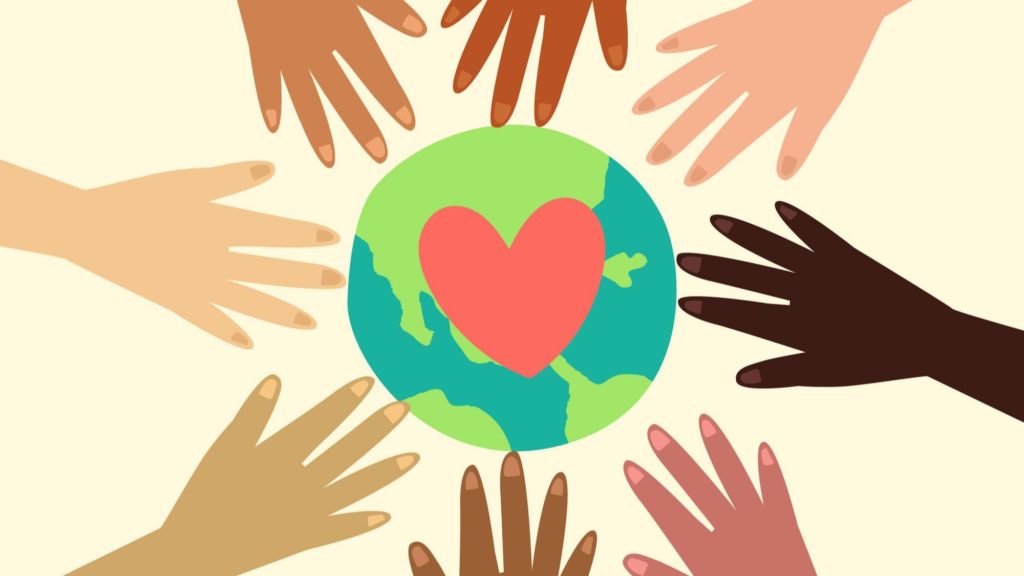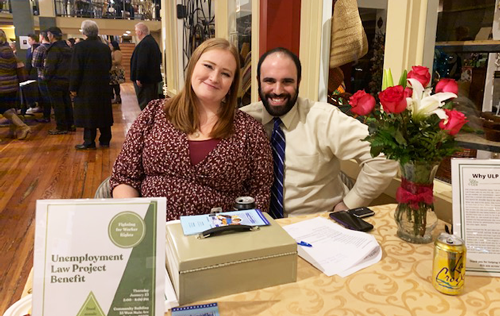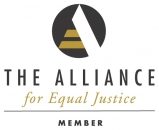
Coming Together During Uncertain Times

By Behnaz Mansouri, Senior Attorney, and Erin O’Brien, Legal Assistant
Established in 1984, the Unemployment Law Project prides itself on being a fierce advocate for those struggling to secure unemployment benefits. 2020 has been a painful and trying time for all of us. Full of uncertainty due to the COVID-19 pandemic, political strife, and economic hardship, each and every one of us has made sacrifices and experienced unexpected losses. We want to acknowledge and honor those sacrifices and losses, whether it’s the mental framework for the life you thought you’d be living this year, the loss of your home and livelihood, or the devastating loss of a loved one. We also want to take a moment to express our gratitude and admiration for the people who make the expansion of our work possible.
With the aid of additional grant funding and increased donations this year, the Unemployment Law Project increased staffing capacity by more than 300%. Each month ULP staff receive and respond to hundreds of calls and emails from individuals needing assistance filing their claim, responding to overpayment notices, contacting ESD or seeking representation for their appeal hearing.
To further educate people on the constant evolution of pandemic unemployment assistance, ULP has hosted over 30 weekly webinars. Our webinars have also been inclusive for communities of color, conducted in various languages, and addressed the needs of specific professional groups. While our staffing size has increased, ULP continues to rely heavily on the contributions of private attorneys. Throughout 2020, twenty-five (25) attorneys participating in the ULP Pro Bono Program vigorously represented 118 people who appealed their denial of benefits. With the establishment of the Emergency UI Claimant Representation Program, managed by ULP and funded by the Office of Civil Legal Aid, over 60 private attorneys have energetically responded to our call to action for increased representation of clients during an appeal hearing.
The Unemployment Law Project is proud of the successful advocacy work we have accomplished this year to support Washingtonians, and we would not have been able to achieve these great heights without the partnerships built within our vibrant legal community.
A Small Bright Side of the 2020 Benefit Program Breakdowns: Media Attention to Claimants’ Plights
By Anne Paxton, Staff Attorney & Policy Director
It may have started with hiring our webmaster Andy Paroff in March. Acquiring a Zoom account and holding weekly webinars from April to the present probably helped. Participating in a lawsuit against the Employment Security Department might well have been the decisive factor. Whatever the triggers, ULP has been progressively upping its game in the media and on the web over this past year. And we believe that’s been a good thing for claimants.
Unemployment insurance is normally a side-issue in the press, although during recessions it can occupy center stage. But the sudden, massive surge of unemployment that the pandemic brought this year pushed UI and its failings in Washington state under an especially unsparing spotlight. Our Employment Security Department took a beating in the media as scam artists posing as legitimate claimants made off with more than $500 million in benefit payments and claims became bogged down by understaffed phone lines, IT problems, interminable processing delays, and a paralyzed appeals process.
Even though ULP focuses on Washington State claimants, it is the country’s only state legal aid organization devoted solely to unemployment issues. So alongside the flood of calls from claimants seeking help with benefits applications, ULP staff found ourselves getting calls for comment from dozens of outlets ranging from KING5 News, Politico, and the Seattle Times to NPR’s Marketplace, CNN, and the New York Times. In many cases, ULP clients agreed to tell their stories to reporters as well.
For senior attorney Behnaz Mansouri, an early caller was CNN, covering the claims processing delays back in March when two months seemed like a long wait. As she told the network, many claimants are non-native English speakers and do not hold traditional jobs, making it especially challenging for them to navigate the system. “It’s convoluted. It’s unclear. It’s unprecedented,” she said, adding that many people who receive denial letters may not return and apply for the federal Pandemic Unemployment Assistance program. In August, the web news magazine Politico aired Behnaz’s concern about the loss of the $600 per week PUC benefit. The year “has been made bearable by this patchwork of financial assistance,” she said. “And now without it, I fear, it’s going to become unbearable.”
Andra Kranzler, an attorney working with ULP, explained to KIRO Radio in a July interview how applicants may be wrongly blamed for innocent errors. “You can’t really change your answer if you make a mistake or you don’t understand the question, and there’s not really an easy way to fix it,” Andra said. The inability to reach a human at ESD for explanation compounds the problem, she pointed out, since a single error on a form can land a person in the adjudication process or force them to appeal, cutting them off from funds for months.
Spokane’s Spokesman Review featured ULP Spokane managing attorney Juliana Repp in May, recounting how her tribal heritage and disabilities of a family member had helped fuel her passion for the underdog. Because so many claimants have found ESD unreachable, the ULP office often gives advice on the regulations and on the process of pursuing a claim—but at times also serves as a sympathetic sounding board for frustrated claimants, Julie explained to the newspaper. “They’re trying to figure out why the process hasn’t gone smoother, and they’re anxious because they don’t know where their check is.”
In June, Oregon Public Broadcasting focused on how offsetting benefits can have dire outcomes for low-income people and missing a piece of mail with a hearing date or appeals deadline could mean getting stuck with an overpayment of $500, $15,000, or more. “Then interest is added and wages are garnished. Bank accounts are attached, tax refunds are intercepted, and liens are placed on property,” ULP executive director John Tirpak told OPB. “And during the pandemic, in spite of our advocacy, they are still collecting overpayments in Washington state.” Since the local economy contracted, “Hundreds of people have called asking ULP for help every week,” the station also reported, quoting John. “Many people have run through their savings. Some have moved out of state.”
Perhaps the most surprising—but welcome—development for ULP has been our raised profile on social networks, thanks to Andy and to ULP Farmworker Fellow Lavena Staten. ULP has been actively doing outreach to print, broadcast, and online media to clarify the confusing alphabet soup of benefit programs and to explain fuzzy or downright misleading parts of the online benefit application. With help from law student and ULP intern Kristen Moran, Lavena broke new ground for ULP when she posted several quick TikTok videos with these goals in both English and Spanish—with some even going viral. At last count, Lavena’s video on overpayments had won 80,000 TikTok views and was picked up by a Seattle TV news station as well.
The pandemic continues, and although the unemployment spikes seen in March and April are unlikely to recur, the nation remains under a siege of joblessness. Amid the countless policy debates that lie ahead, ULP intends to do our best to keep the need for reform of unemployment benefit programs front and center.
Spokane Benefit a Success

Spokane Unemployment Law Project through Juliana Repp, Managing Attorney and John Tirpak, Executive Director, hosted a magical benefit event on January 23, 2020, at the Community Building. It was a wonderful night of food, music and over thirty unique auction items donated by the Spokane community. Against a backdrop of music by the renowned Craig Catlett Jazz Quartet, participants enjoyed a delightful array of appetizers from Fery’s catering with wine, beer and soft drinks. Mikayla Goodwin and Andy Paroff, ULP interns, were integral in making this night a success. Our sponsors included: Breean Beggs, Paukert and Troppmann LLC; Winston & Cashatt; Machinists Union, District 751; Cooney Law Offices; United Steelworkers Local 338; and the Law Office of D.C. Cronin. Former managing attorneys, Laurie Powers and Monica Holland and numerous former interns, also joined us at the event. Thank you to all, who made this such an enjoyable evening.
Rising to the Challenge: Working at the Unemployment Law Project in Unprecedented Times
By Rachel Platin, Spokane Lead Legal Intern
Like almost everything lately, working at the Unemployment Law Project was a different experience this year than anyone could have expected. Like many other students, I had a different legal internship lined up for the summer – only for COVID to cancel it at the last minute. Thankfully, I got connected with the Managing Attorney at the Spokane office, Juliana Repp, and was able to start working at ULP.
Due to the safety concerns surrounding the pandemic, our office has been working almost fully remotely. In fact, I have been working for ULP since May and have not met my coworkers in person or even been to the ULP office yet. Not your typical internship experience. However, what I have learned and the people I have been able to help have made it an incredibly rewarding experience. I have been really inspired by the adaptation and resilience of the Spokane office during this time. We have several weekly zoom meetings and frequent phone calls and emails; I often forget that I am not in the office with everyone. It is helpful that all our hearings are held on the phone anyways, as is standard practice for the Office of Administrative Hearings. I worked on a Superior Court brief earlier this summer and I was able to have the opportunity to be present at the hearing via Zoom. Had it been normal times, I likely would not have been able to attend the hearing as it would have been on the other side of the state. I am looking forward to rotating with other interns and getting to spend some time in the office (safely)!
We are seeing an unprecedented number of unemployment claims during the past 8 months. More and more people are out of work and most of the cases we have been getting are somewhat COVID-related. Very rarely do we get cases that are just natural, cyclical unemployment issues. I find that it is often difficult to separate the emotions and the work from each other, as the claimants who are calling our office for help are becoming more and more desperate for help. I have had many claimants who are calling from their cars where they now live, have kids doing online school in the background, or are down to their last dollar to feed their family. Most phone calls we get are from people just so glad to get a real person on the phone, as it is virtually impossible to get ahold of the Employment Security Department with the number of claims the agency is dealing with. I am thankful for the existence of the Unemployment Law Project and the incredible work that this organization does to help those who need it the most. I have learned the most from hearing my claimants’ stories. I am incredibly interested in how societies function and how every person plays a part in society and hearing the personal stories from claimants in every single industry has been very eye-opening. Most of these workers are the backbone of society, including truck drivers, suppliers, hospitality workers, etc. and I have gained a great deal of appreciation for them during the pandemic that I will be sure to hold moving forward. I am thankful to be in a position to help advocate for their unemployment benefits and also work on several policy projects with ULP to try and improve the unemployment insurance system in the future.
Historic Victory for Washington Workers

By Lavena Staten, SU Farmworker Fellow
Last month, the Washington Supreme Court decided that dairy workers in Washington are entitled to overtime pay when they work over 40 hours in a week. This decision was monumental. Excluding agricultural and domestic workers from overtime pay and other worker protections stems directly from slavery, a history acknowledged in Justice Steven González’s concurring opinion. At the state level, Washington’s Minimum Wage Act explicitly excludes agricultural workers from overtime. RCW 49.46.130(2)(g). Meanwhile, a shortage of agricultural laborers in Washington means fewer workers working longer hours.
Now, the highest court in the state has determined that excluding dairy workers from overtime laws violates the privilege and immunities clause of the Washington State Constitution. The majority opinion states that “all Washington workers in dangerous industries” have a fundamental right “to receive workplace health and safety protections.” The Court reasoned such protections dampen employer desires to force employees to work excessive hours for too low of pay. While the court focuses on non-seasonal dairy workers, the underlying statutory issue and additional analysis may apply more broadly to all agricultural workers. Meanwhile, the dissent argued that no workers have a right to overtime under the Washington constitution.
And agricultural employers responded with empty threats of increased automation and a disproportionate impact on small farms. However, many of Washington’s biggest crops–including hops, cherries, pears, and berries–require delicate picking that can only be achieved through human labor. Further, small farms are in much more danger from increasing concentration and consolidation of agricultural inputs, processing, food manufacturing, and food retail companies, which use their size to control small farms and eventually lead to their downfall.
Requiring overtime protections for farmworkers is a monumental step in confronting the racism and inequality in our economy, but it is not the final hurdle for those who work in agriculture: farmworkers are constantly exposed to toxic pesticides on the job and they are ten times more likely to die at work than the average worker. Nationally, farmworker families make $17,000 per year on average. Washington and the federal government must do more to protect the workers who feed us.
Advocating for Clients During a Pandemic
By Juliana Repp, Managing Attorney, Spokane ULP
When Covid-19 hit, I wasn’t sure how I would train the incoming interns/externs for the Spokane ULP Office due to limitations on occupancy in the Community Building. We improvised and held many zoom meetings. Claimants were patient and understood that part of what we do at ULP is teach and mentor interns on how to represent claimants during all facets of their cases including representing them at their appeal hearings within the Office of Administrative Hearings. Claimants had no qualms about six interns sitting in on zoom meetings, pre-hearing conferences and hearings, to learn how to advocate for them. In the midst of a months-long pandemic, teaching and working by zoom, email and limited in-office work, a formidable legal aid team was formed.
Glory Crocco
Glory is a second-year law student at University of Mississippi School of Law. Glory began working at ULP in May 2020 and noted that working with the Spokane office team has been the best part of her experience, along with being able to help claimants across the state.
Emily Ganz
Emily Ganz is a second-year student at Gonzaga University School of Law. Emily loves working at the Unemployment Law Project, where she can closely communicate with clients and hone her skills as an advocate.
Sarah Bodisco
Sarah is an undergraduate at Gonzaga studying Economics and Political Science. In her free time, you can find her reading (her favorite authors are John Krakaur and Kurt Vonnegut), biking the Centennial Trail, or lounging by the ocean/river/any available body of water. Sarah started at ULP in June of 2020, and noted that it has been a really unique experience to only have worked and interacted with other staff virtually. She believes it has pushed us all to be extra diligent and work hard for our community in need.
Rachel Platin
Rachel is a 3L student at Gonzaga University School of Law. A native of Seattle, Rachel has fallen in love with Spokane and intends to stay on this side of the state after graduation and work in employment law. She began working at ULP in May 2020 and loves her coworkers at the Spokane office and helping as many people as possible with their unemployment issues. In her free time, she loves hiking, skiing, biking, and spending time with friends and family.
Wesley Groot
Wesley is a second-year student at Gonzaga University School of Law. Wesley started working with the Unemployment Law Project in May of 2020, and has found the work to be incredibly fulfilling, especially during a time with record unemployment. He enjoys working for a firm dedicated to lending assistance to those in need.
Jakob Salazar
Jakob is a second-year student at Gonzaga University School of Law. He joined the ULP team in May 2020 and was immediately moved by the compassion and dedication of my colleagues, as well as the often heartbreaking stories of our clients. He is continually inspired by the perseverance and equanimity of so many of our clients as they struggle through the unprecedented unemployment-related difficulties resulting from the global pandemic. He feels like ULP provides a necessary service to the community by giving a voice to unemployed workers and helping them get back on their feet, and he is proud to contribute to that service.
Thanks from the Director
By John Tirpak, Executive Director
2020 has been an unprecedented year for ULP. We have been able to increase our client services due to your support.
We would like to thank the Sheridan Law Firm for their work on the Petition for the Writ of Mandamus. Special thanks to Jack Sheridan, Justin Abassi, Andra Kranzler, and Tony Dondero. The court hasn’t ruled on the case yet, but we expect a ruling in the coming year.
Special thanks to the Office of Civil Legal Aid, the Legal Foundation of Washington, King County, and the Washington State Labor Council for increased support during the COVID-19 crisis.
Our Brew Review Onvine event was a big success. Thanks to our sponsors: MacDonald Hoague & Bayless, Barnard Iglitzen & Lavitt, Terrell Marshall Law Group, Breskin Johnson & Townsend, Chipmonkey Wine, and Revolution Repair.
If you want to support the work of ULP, please contact me at jtirpak@ulproject.org for more information.

The Unemployment Law Project Team
ULP STAFF
John Tirpak, Executive Director/Attorney
Juliana Repp, Spokane Managing Attorney
Anne Paxton, Staff Attorney & Policy Director
Hyun-Ji Lee, Staff Attorney
Behnaz Mansouri, Senior Attorney
Katelyn Morgaine, Staff Attorney
Meg Bridewell, Staff Attorney
Andra Kranzler, Staff Attorney
Lavena Staten, SU Farmworker Fellow
George Leach, UW Employment Equity & Access Fellow
Ahmed Abdi, Outreach Coordinator
Jason Arends, Office Manager/Paralegal
Erin O’Brien, Legal Assistant
Stephan Elmer, Legal Assistant
Jill Cornaggia, Spokane Paralegal
ULP BOARD OF DIRECTORS
Joseph Shaeffer, President
Jennifer Murray, Vice President
Jeneé Jahn, Treasurer
Eric Gonzalez, Secretary
Amanda Ballantyne
Lillian Kaide
Andres Munoz
Erin Pettigrew
Jennifer Yogi
ULP VOLUNTEERS
Aaron Chatterjee
Abe Ritter
Alex Ellis
Alexia Diorio
Alexis Chouinard
Alexis Mei
Alisa Smith
Alizeh Bhojani
Almira Jane De La Cruz-Butler
Alyssa Krueger
Andy Paroff
Andy Sacks
Angie Weiss
Anna Marie Shearlock
Annie Holden
Asha Abdulle
Ashley Gomez
Austin Field
Behnaz Mansouri
Ben Ushka
Brian Carmichael
Caleb Carr
Carly Zipper
Chenelle Love
Chloe Merino
Chris Hendry
Chrissy Svihus
Clive Pontusson
Cortney Feniello
David Ringold
David Totten
Dean Lawrence Petitta
Deborah Sundblad
Deepak George
Devin Hogan
Devon Nikfard
Dustin Vail
Elizabeth Clampitt
Ellie White
Emily Ganz
Eric Nusser
Erin O’Brien
Estey Chen
Gabrielle Ayala-Montgomery
Gelline Nicolas
Glory Crocco
Gregory Skidmore
Hanna Choi
Hannah Aho
Hannah Driscoll
Ian Cairns
Iris Yan
Isabel Skilton
Isabell Rocha
Jaclyn Tani
Jagdeep Sekhon
Jakob Salazar
Jaqueline Beltran
Jennifer Seely
Jessica Cable
Jessie Miglarese
Joel Nichols
John Curry
Joseph Sims
Julia Fleming
Justine Taylor Yarington
Kathryn Penrod
Katie Dimsho
Kay Fuhlman
Kelly Rutledge
Kristen Moran
Kyle Madsen
Lauren Berkowitz
Lauren Mamaghani
LeAnn McDonald
Lin Li
Madeline Crowley
Marielle Maxwell
Maya Itah
Megan Lee
Mikayala Goodwin
Mitchell West
Molly Utter
Morgan Robertson
Nasrin Chaudhry
Nate Blanchard
Nathanial Putnam
Nicole Lundholm
Nina Mesihovic
Oliver Batkoff
Olivia Bloom
Pam Crone
Rachel Horvitz
Rachel Platin
Robert Bulanda
Roberto White
Romana Bruderer-Schwab
Sara Suryan
Sarah Bodisco
Sayer Rippey
Selena Ng
Silvan Schuttner
Sophie Geguchadze
Spencer Satin
Stepen Jay Hatton
Stephan Elmer
Victoria Banks
Victoria Ha Nguyen
Wesley Groot
Yinbing Lin
Ysabel Mullarky
Zoe Wood


